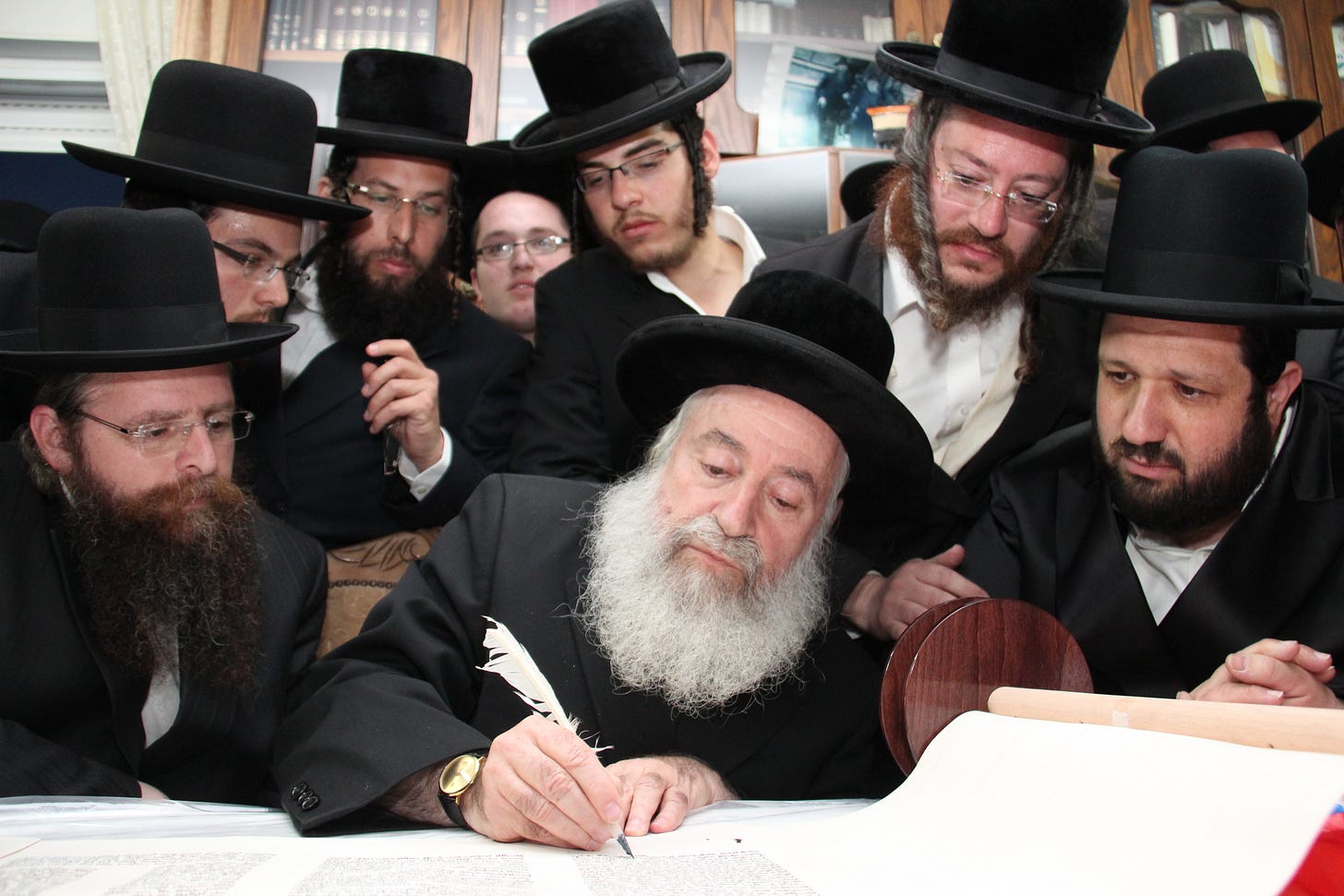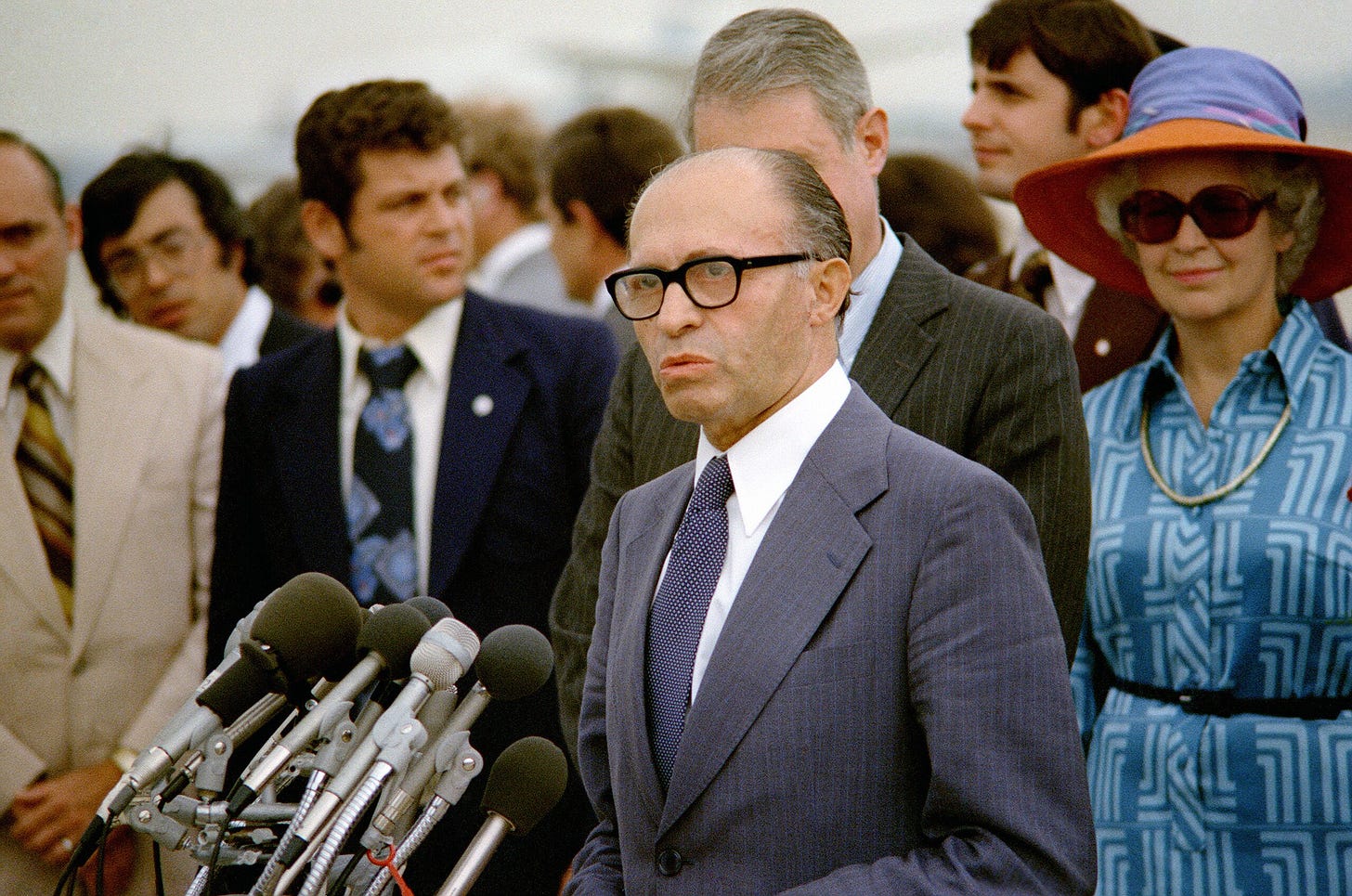The Major Narratives Shaping Israeli Politics
It is crucial to understand Israeli voters if you truly want to understand Israeli politics.
Please consider supporting our mission to help everyone better understand and become smarter about the Jewish world. A gift of any amount helps keep our platform free of advertising and accessible to all.
You can also listen to the podcast version of this essay on Apple Podcasts, Google Podcasts, and Spotify.
Israel has one of the higher voter turnout rates among democratic countries, so it is crucial to understand Israeli voters if you truly want to understand Israeli politics.
Whereas many tend to paint a simplified picture of Right versus Left, the reality is that Israel has more than 20 political parties, meaning there is a myriad of nuance and depth that gets lost when we oversimplify.
Each party creates its own narrative to attract voters, wrapped around a variety of circumstances, including obvious ones like religious magnitude (or lack thereof) and socioeconomic standing, as well as ethnic backgrounds, how many generations a voter’s family has been living in Israel, and in which part of the country they live.
There are seven major narratives which ultimately determine why Israeli voters cast their ballot for certain political parties.
Narratives are artifacts of a special kind, intentionally crafted devices which fulfill their storytelling function by manifesting the intentions of their base. Such devices offer varying points of view, including ironic points of view.1
For example, on the far Right, heavily religious Israelis are often the most critical of non-religious (but still Jewish) Israelis, despite the Jewish commandment to love one’s fellow Jew.
And, on the far Left, heavily secular Israelis want to rid the country of its Jewish character and make it a free-for-all democracy. This would likely see Jews become a minority in a few generations, replaced by an Arab majority who, once democratically voted into power, would probably shelve the aforementioned democracy, since no Arab state past or present has shown a true and persistent appetite for the type of socialist-democratic governance that heavily secular Israelis crave.
Now, let’s take a look at each of the seven camp’s narratives, from the farthest Right of the political spectrum, to the extreme Left:
1. The Charedim (Ultra-Orthodox)
According to data from a 2023 report by the Israel Central Bureau of Statistics, Charedim have a current population growth rate of four-percent per year. This means that, by 2030, they will form 16-percent of Israel’s population, 20-percent of the total population in 2040, and 32-percent in 2065.2 By then, one of every two Israeli children will be Charedi.3
These Israelis strictly adhere to halacha (Jewish law) and staunch Jewish traditions, and live in mostly closed-off communities (e.g. Bnei Brak, Mea Shearim) to preserve these laws and traditions.
Whereas traditional or secular Jews are frightened by ultra-Orthodox customs, like gender segregation, Charedim oppose the description of their customs as exclusionary or prejudice. For example, Charedi women see gender-based segregation as a totally normal and fundamental part of daily life.
The chief political division among Charedi Jews has been in their approach to the State of Israel. Only a minority of them consider themselves to be Zionists, and Charedim who do not consider themselves as such fall into two camps: non-Zionist and anti-Zionist.
The ideologically non-Zionist United Torah Judaism alliance represents a moderate and pragmatic stance of cooperation with the State of Israel, primarily seeking to influence state and society in a more religious direction, while maintaining welfare and religious funding policies.
The Shas party represents Sephardic and Mizrahi Charedim, who typically have a more enthusiastic support for the State of Israel and Israel Defense Forces.
Anti-Zionist Charedim, who are a minority but are more publicly visible than the non-Zionist majority, believe that any Jewish state prior to the Messiah’s arrival is a sin.
2. The Religious Zionists
Also known as religious nationalists, these Israelis subscribe to three main pillars: the Land of Israel, the People of Israel, and the Torah of Israel.
Religious Zionists believe that Eretz Yisrael (the Land of Israel) was promised to the ancient Israelites by God, and that present-day Jews are obligated to possess and defend the land in ways that comport with the Torah’s high standards of justice.
Thus, many religious Zionists live in Judea and Samaria (also known as the West Bank) and are proud to be called settlers.
The main ideologue of modern Religious Zionism was Rabbi Abraham Isaac Kook (born in 1865), who justified Zionism according to Jewish law, urged young religious Jews to support efforts to settle the land, and encouraged secular Labor Zionists to give more consideration to Judaism.
“Zionism was not merely a political movement by secular Jews,” he said. “It was actually a tool of God to promote His divine scheme, and to initiate the return of the Jews to their homeland — the land He promised to Abraham, Isaac, and Jacob. God wants the children of Israel to return to their home in order to establish a Jewish sovereign state in which Jews could live according to the laws of Torah and halacha, and commit the mitzvot of Eretz Yisrael (commandments which can be performed only in the Land of Israel).
“Moreover, to cultivate the Land of Israel was a mitzvah by itself, and it should be carried out. Therefore, settling Israel is an obligation of the religious Jews, and helping Zionism is actually following God’s will.”
3. The Likudnikim
Likudnikim are people who vote for the Likud party, a moderately Right-wing program founded in 1973 by Menachem Begin and Ariel Sharon, and now headed by current Israeli Prime Minister Benjamin Netanyahu.
In Hebrew, Likud means “consolidation,” since it represented a consolidation of the Israeli Right.
From its establishment, Likud enjoyed great support from blue-collar Middle Eastern Jews (known as Mizrachim and Sepharadim), who were significantly underrepresented in Israeli politics prior.
Aside from Yemenite Jews, most Middle Eastern Jewish immigrants and refugees started arriving to the State of Israel, founded in 1948, in the late 1940s and throughout the 1950s. They were placed in rudimentary and hastily erected tent cities, often in development towns on the peripheries of Israel (the least-desirable areas).
They also settled in moshavim (cooperative farming villages), but many Middle Eastern Jews were craftsmen and merchants, meaning farm work was foreign to them.
Since the majority had to leave property behind in their former countries as they journeyed to Israel, many of these Middle Eastern Jews suffered a severe decrease in socioeconomic status aggravated by their cultural and political differences with the dominant European Jewish communities.
Between 1948 and the early 1980s, more than 850,000 Jews left or were expelled from countries in the Middle East and North Africa. In 2005, 61-percent of Israeli Jews were of full or partial Middle Eastern ethnicity.4
For Middle Eastern Jews who came from Arab countries, living in Israel is the continuation of their Jewish identity and traditions. In their minds, the State of Israel was not created because of the Holocaust (typically an Ashkenazi Jewish mindset), but because they wanted to realize a 2,000-year dream: a Jewish return to the Land of Israel.
Thus, Middle Eastern Jews consider themselves first and foremost Jewish, and then Israeli, which shapes their political views, such as a reluctance to negotiate with Israel’s Arab neighbors because they have called for a destruction of the Jewish state.
Ironically, though, Likud’s cofounder, Menachem Begin, entered into Israel’s first peace treaty with an Arab country (Egypt) in 1979.
4. The Centrists
The political center is primarily made up of two camps:
Second and third generation Israelis who feel more Israeli and less of whichever ethnic group(s) they come from (e.g. Middle Eastern, Ashkenazi); and
New immigrants to Israel from democratic countries, who have democratic values but are also very Zionist
The party’s main political views are a diplomatic initiative for two-state peace with the Palestinians (with major restrictions on the Palestinian state), legalized civil marriage, the responsibility of all citizens to serve in the army (including Charedim), and the protection of the Jewish identity of the state, as well as the identities of all of its citizens.
Many centrists are educated and thus have opportunities for socioeconomic upward mobility, particularly those of Middle Eastern Jewish backgrounds. Career trajectory, the economy, and cost of living are important parts of their political decision-making, and they are also proud to be Jewish. This often results in cognitive dissonance.
5. The Moderate Left (also known as Labor)
Until 1977, all Israeli prime ministers were affiliated with the Labor movement, but since 2001, the party has been in major decline. Many of these Israelis are secular Jews or atheists, and subscribe to socialist Zionism, a tool for building an advanced socialist society in the Land of Israel, while solving the problem of antisemitism.
For example, the early kibbutz was a communal settlement that focused on national goals, unencumbered by religion and precepts of Jewish law (such as eating kosher). Socialist Zionists were one of the results of a long process of modernization within the Jewish communities of Europe, known as the Haskalah, or Jewish Enlightenment.
While originally a democratic socialist party, Labor has evolved into a program that supports a mixed socialist-capitalist economy, with strong social welfare. The party’s foreign policy retains a strong orientation toward the United States (especially the Democratic Party), and its security policy maintains that a permanent peace with the Palestinians can only be based on enforceable agreements.
Labor supports a two-state solution and the creation of an independent, demilitarized Palestinian state.
On social issues, Labor supports same-sex marriage, the legalization of cannabis, advancing surrogacy rights for gay couples, and limited public transportation on Shabbat.
Labor is committed to the continued existence of Israel as a Jewish and democratic state. It believes in maintaining a strong defense force and also supports the promotion of individual human rights, as well as the adoption of a written constitution (which Israel does not have) that would entrench human rights.
6. The Extreme Left
The extreme Left in Israel wants a purely democratic state, complete separation of religion and state, and equal rights for all inhabitants. Many of them believe Israel was founded as a direct response to antisemitism and the Holocaust. And they also believe that antisemitism and the Holocaust are far behind us, so their logic presumes that the need for a Jewish state no longer exists.
Thus, the platform of the extreme Left revolves around social issues, with a predominant emphasis on Israeli occupation of the Palestinians. Many Right-wing Israelis believe that “the tendency of this Left today is that they care more about the Palestinians than about their Jewish brethren.”
The extreme Left seeks peace between Israel and the Palestinians, based on a two-state solution as laid out in the Geneva Accord, which purports:
A mutual Israeli-Palestinian declaration of an end to the conflict and future claims
Mutual recognition of both nations and their right to an independent state
Almost complete Israeli withdrawal to the 1967 borders, with a limited number of settlement blocs on the basis of a one-to-one land swap
A comprehensive solution to the issue of the Palestinian refugees based on the Clinton Parameters from 2000, of which the main component will be compensation and an independent Palestinian state
Jewish Jerusalem as Israel’s capital and Arab Jerusalem as Palestine’s capital with Jewish areas under Israeli sovereignty and Arab areas under Palestinian sovereignty
A non-militarized Palestinian state and detailed security arrangements
7. The Israeli Arabs
Israeli Arabs, or Arab citizens of Israel, are the largest ethnic minority in the country. They comprise a hybrid community of Israeli citizens with a heritage of Palestinian citizenship; mixed religions (Muslim, Christian, or Druze); and bilingual in Arabic and Hebrew.
The Arab population in 2019 was estimated at 1.89 million, representing 21 percent of the country’s total population.5
Israeli Arabs typically vote for centrist and Left-wing parties, though some Druze have been known to vote for Right-wing parties.
Generally, there are two types of Israeli Arabs: middle-class and lower-class. Middle-class Arabs are typically educated, work white-collar jobs, and live in mixed Jewish-Arab communities. They tend to vote for Zionist parties because they recognize that, even though they aren’t Jewish, the State of Israel is a great place to live compared to other Arab countries.
Lower-class Arabs are usually uneducated, work blue-collar or black-market jobs, and live in exclusively Arab communities (known as Arab villages). Many of them do not vote, and those who do tend to vote for extreme Left Arab political parties which oppose the reality of Israel as a Jewish state.
Currie, Gregory. “Narratives and Narrators: A Philosophy of Stories.” Oxford University Press. 2010.
“Haredim are fastest-growing population, will be 16% of Israelis by decade's end.” The Times of Israel.
הודעה לתקשורת – תחזית אוכלוסיית ישראל עד שנת 2065. Israel Central Bureau of Statistics.
“Why the right-wing Mizrahi vote is misunderstood in Israel.” Middle East Eye.
“Israel’s Independence Day 2019.” Israel Central Bureau of Statistics.






Very informative. Thanks!
As the war goes on, it looks like more Israelis are moving to the right. I consider this hopeful if we stand a chance of winning. This just in (abridged) from Jewish News Syndicate: "Israeli Minister-without-Portfolio Gideon Sa’ar announced Tuesday that his New Hope Party will no longer be part of the alliance with Benny Gantz’s Blue and White, essentially dissolving the Knesset entity called the National Unity Party, which as part of the center-left bloc in the 2022 election. Sa’ar, who joined the emergency government under Prime Minister Benjamin Netanyahu together with senior members of the National Unity Party shortly after the Oct. 7 atrocities, said he would now seek to have his separate faction get its proper representation by being appointed to the War Cabinet. Sa’ar intends to re-establish New Hope as an independent party that will express, in his words, “the national-responsible worldview.” Sa’ar hopes that his sharp break from Gantz’s and Eizenkot’s arms will work in his favor in the memory of right-wing voters. Since the current war broke out, Sa’ar has tried to show more proximity to the right, blurring his alliance with the anti-Netanyahu camp from the previous year—during which he took an active part in the protests against judicial reform—and has even made sure to differentiate himself from Gantz."
https://www.jns.org/netanyahu-poised-to-welcome-former-rival-saar-into-war-cabinet/?_se=YnNlYnJvd0Bhb2wuY29t&utm_campaign=Morning+Syndicate+Wednesday+03132024&utm_medium=email&utm_source=brevo